#remember kids: the catholic church is a sovereign nation
Text
Additional extra protection for ep. 4 and 5

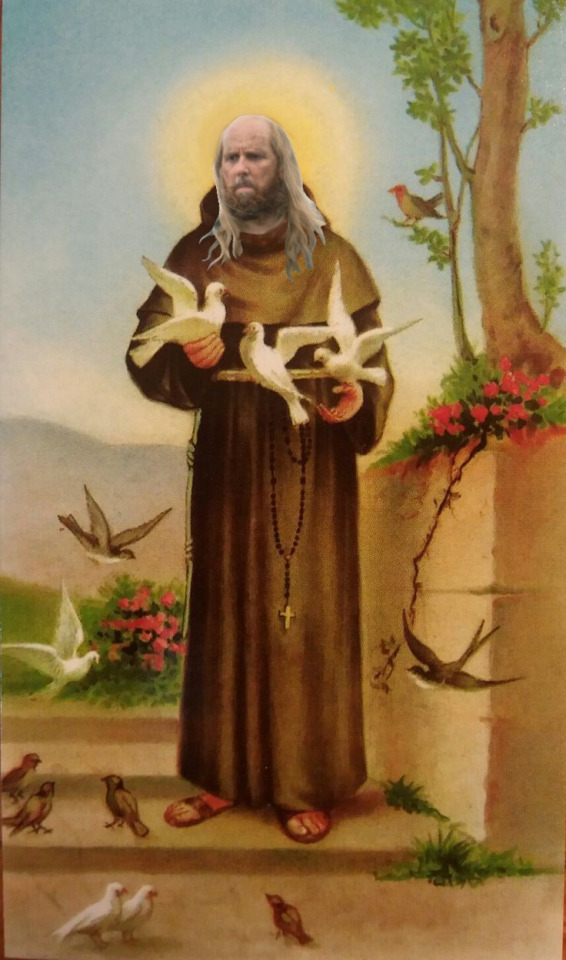
For the holy trinity
#ofmd#our flag means death#ofmd season 2#nathaniel buttons#lucius spriggs#remember kids: the catholic church is a sovereign nation#and it's ok to have a laugh#SEA WITCH#ratboy#santini#icons
12 notes
·
View notes
Text
Day 152: Prague Castle (and the Window that Sparked a War)
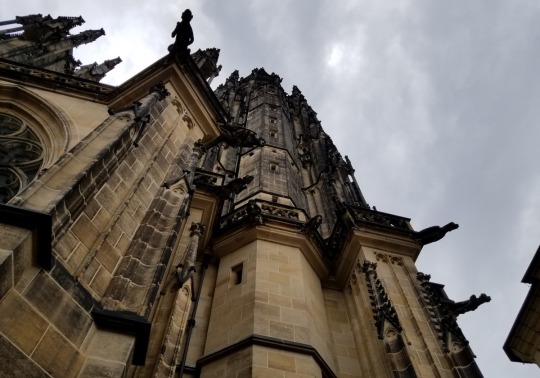
On our last day in Prague, the miserable heat that had been oppressing us throughout our stay finally broke. But it went out with a bang. It stayed above 80 degrees until after midnight and only fell to the mid 70s by morning, where it stayed for the rest of the day.
Still, it was bliss simply to wake up to a merely warm morning. At least, it was bliss for the first few seconds of consciousness I enjoyed before a wasp stung my hand.
I’d never been stung by a wasp before, and at first I didn’t know what happened. It was like a bolt of sheer electric pain coursing through my hand and up my arm. I managed to kill and flush the cursed thing (literally) before it could sting again or call for reinforcements.
I was able to wash and clean the puncture quickly--no real harm done--but my hand was throbbing and stiff for the rest of the day. Not a great start, but luckily things got better.
Prague Castle is on the far side of town from where we stayed, across the Vltava River. So, for the first time since we checked into our flat, we took the metro.
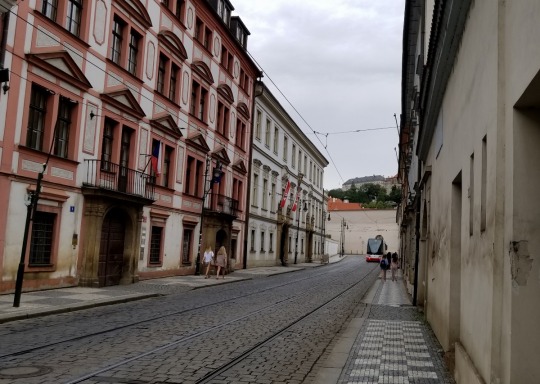
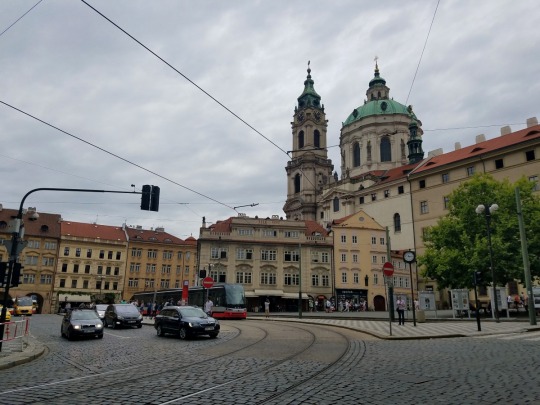
The metro doesn't go all the way to the castle, but that gave us a chance to enjoy a picturesque, if largely uphill, walk through the beautiful, shop-lined streets of the Castle District.
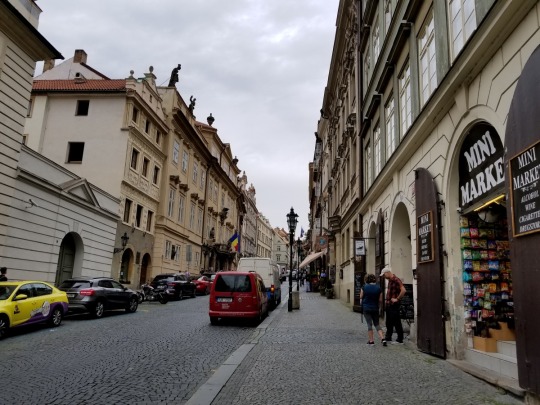
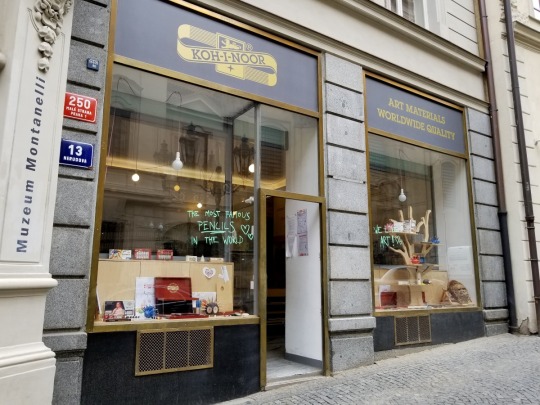
One of the shops was a Koh-i-Noor Hardtmuth--a major Czech pen, pencil, and art supply manufacturer. As a professional stationery fan, I had to go in.

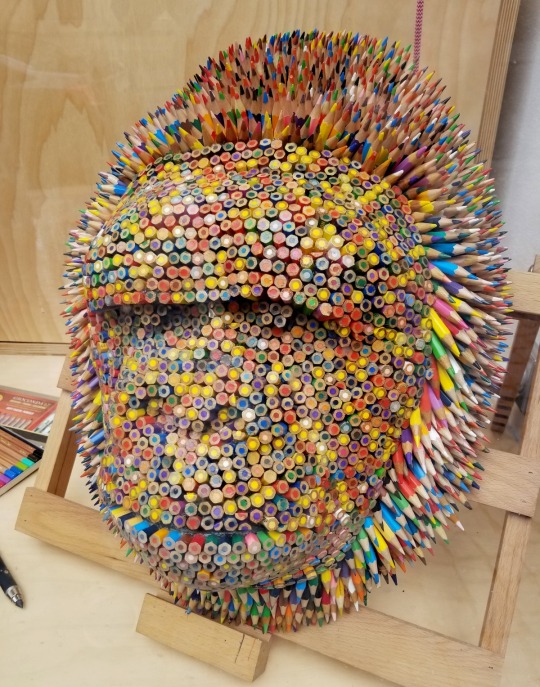
Meanwhile, Jessica entertained her own professional curiosity at a nearby gingerbread museum.
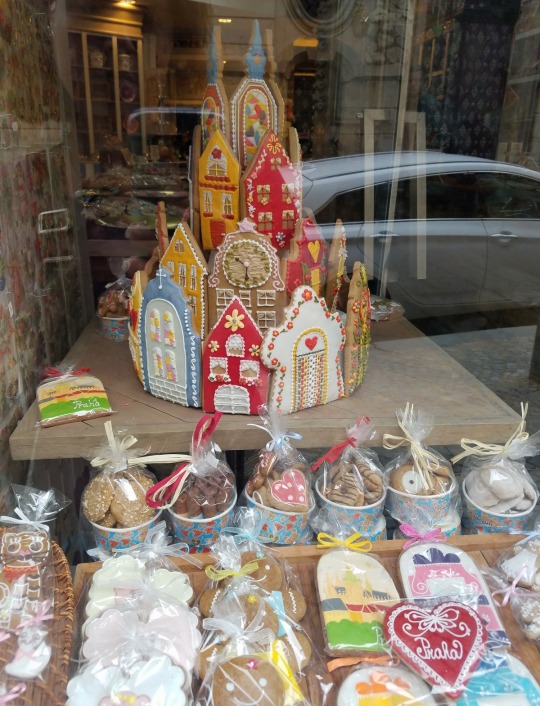
There were also a lot of shops selling puppets and marionettes. The Czech people apparently have a rich history of puppetry dating back to the middle ages.
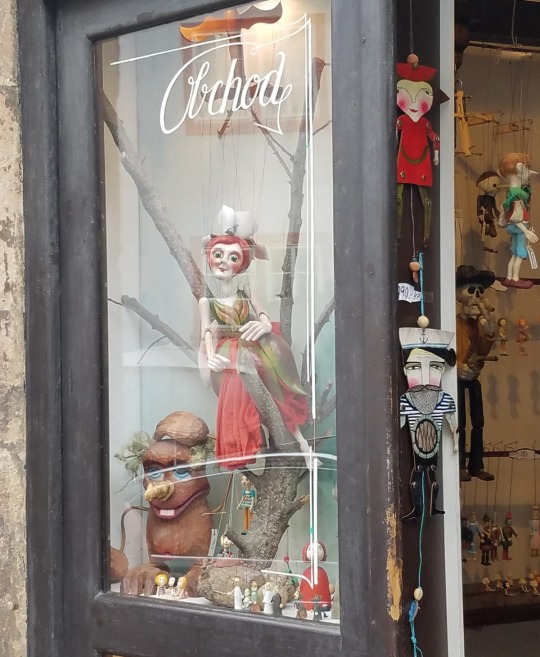
That doesn't necessarily make them less creepy, though.
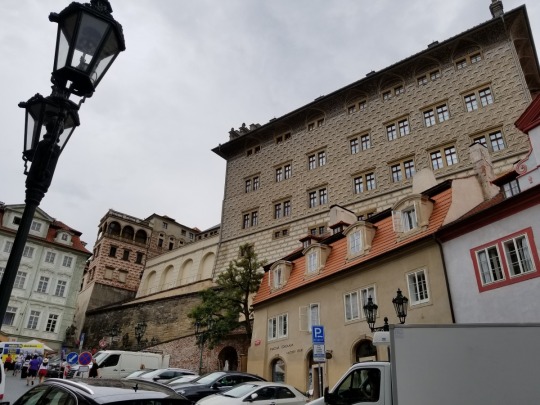
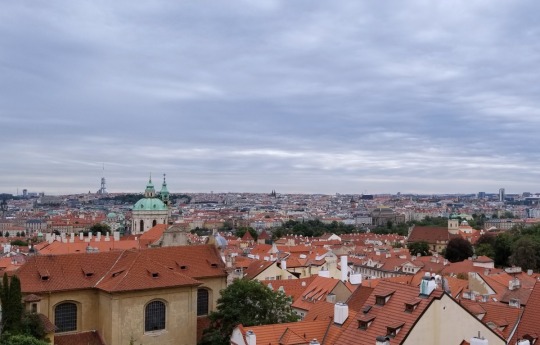
Once we made it to the top of the hill, we had a great view of central Prague. As well the surprisingly close Eiffel Tower.
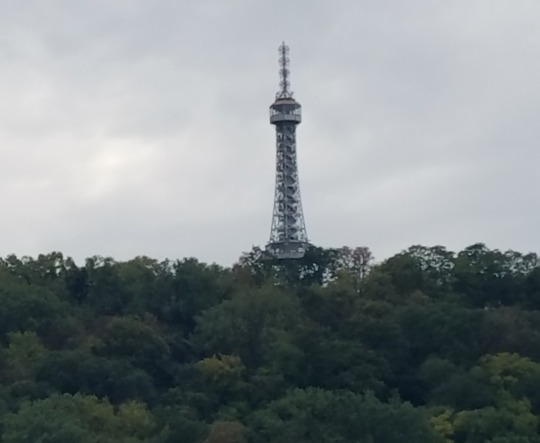
(It's actually the Petrin Lookout Tower, but it was directly inspired by the Eiffel Tower.)
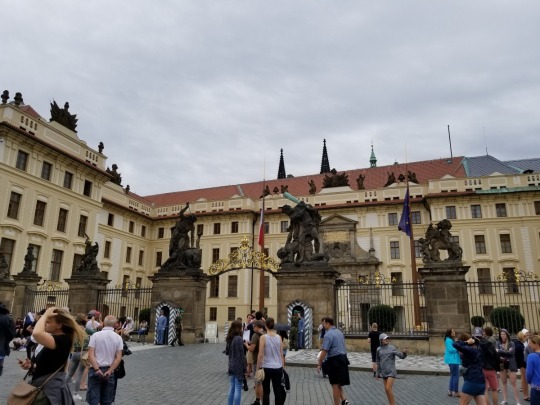
Prague Castle has been an important center of power for centuries--first for the medieval Bohemian kingdoms and later for the Austrian Habsburg empire that eventually absorbed them. It was also the home of the first president of Czechoslovakia after the country gained its independence in 1918.
It's also huge--a sprawling complex of palaces, churches, and squares. By some measures, at least, it is the largest castle on earth.
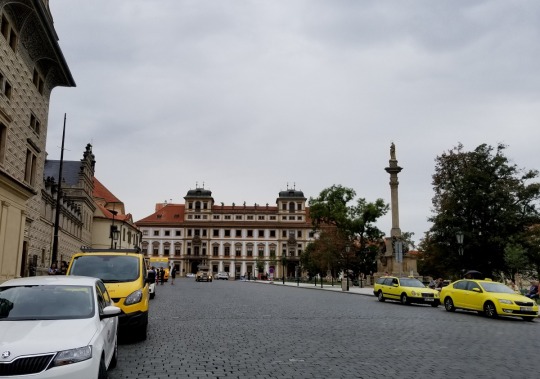
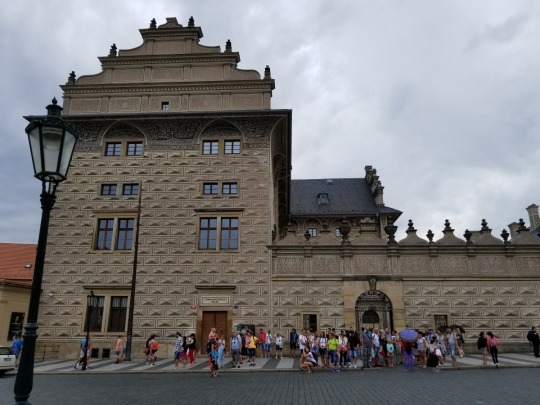
Outside the main castle complex is the Castle Square, lined with former palaces of important noble Czech families. One is still occupied by the Archbishop of Prague. Many of the buildings are painted with an interesting "envelope" pattern that gives the smooth plaster walls the appearance of being made of geometrically carved stones.
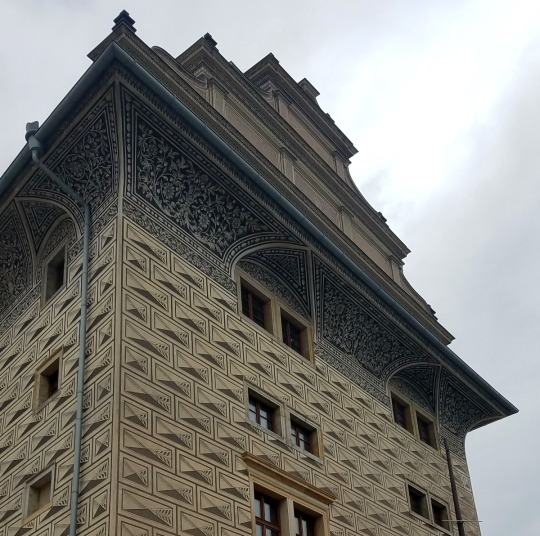

In the center of the square stands an elaborate column erected as thanks to God and Mary for ending a plague. It seems innocuous enough, but it is actually stands as a reminder of Prague's subservience to Habsburg Austria, which was were the tradition of erecting these Marian plague columns came from. After Czechoslovakia gained its independence in 1918, a similar column in the Old Town Square was torn down by a celebrating mob.
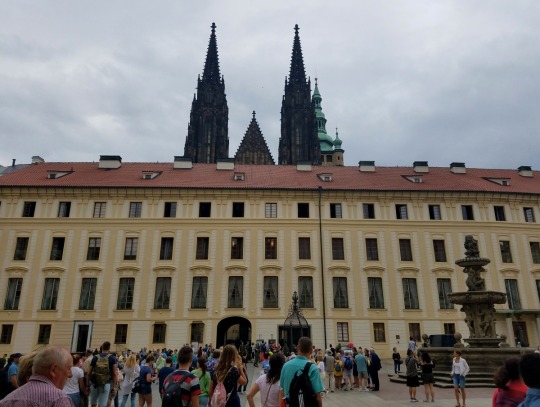
The castle grounds are free to enter as long as you don’t mind going through a security checkpoint. Once inside, you can buy tickets that cover various “routes” or sets of sights. When we got in, there was a huge line at the first outdoor ticket vendor. But the second ticket vendor, just inside a nearby building, had almost no one in line at all. Besides us.
(Thanks for the tip, Rick Steves!)
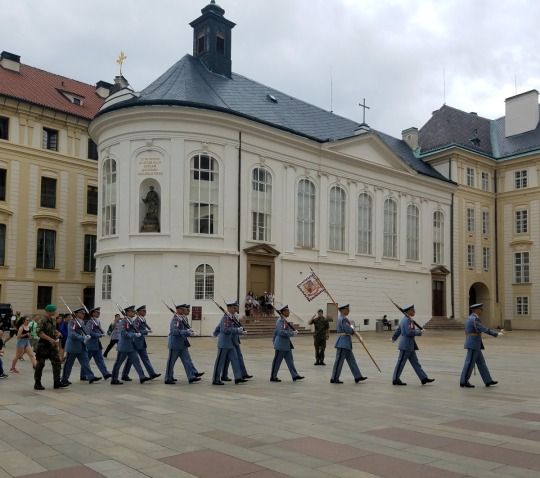
Just as we entered the middle courtyard, we got to see the changing of the guard.
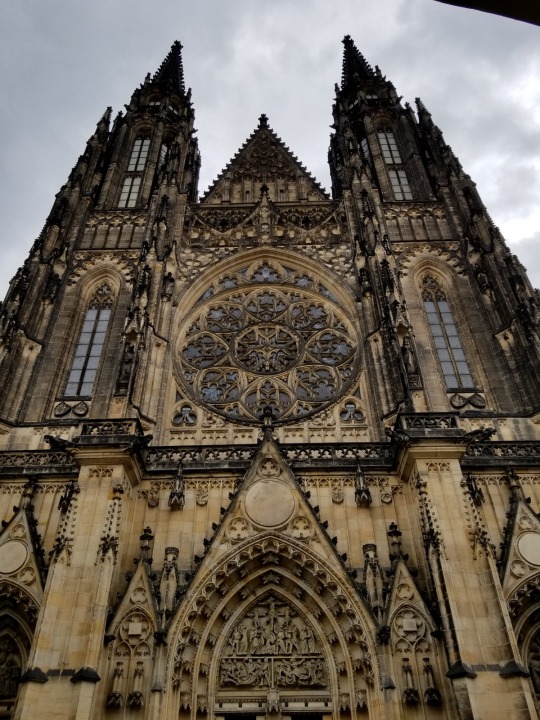
The centerpiece of the castle complex is St. Vitus cathedral. It is big and impressive like a national cathedral should be, and was also one of the slowest cathedrals to ever be built. It was started in 1344, and due to wars, plagues, and religious reformations, it wasn’t completed until 1929. You can see modern architects with business suits carved into the western facade–representing the men who made the final push to get the cathedral finished in honor of Czechoslovakia’s independence following WWI.
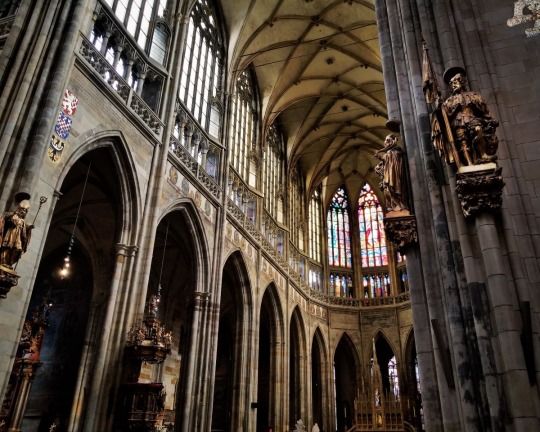
Besides its massive size, beautiful Gothic architecture, and everything else we’ve seen in so many other cathedrals by now, one of the coolest features to us was a stained glass window designed by–you guessed it–Alfons Mucha.
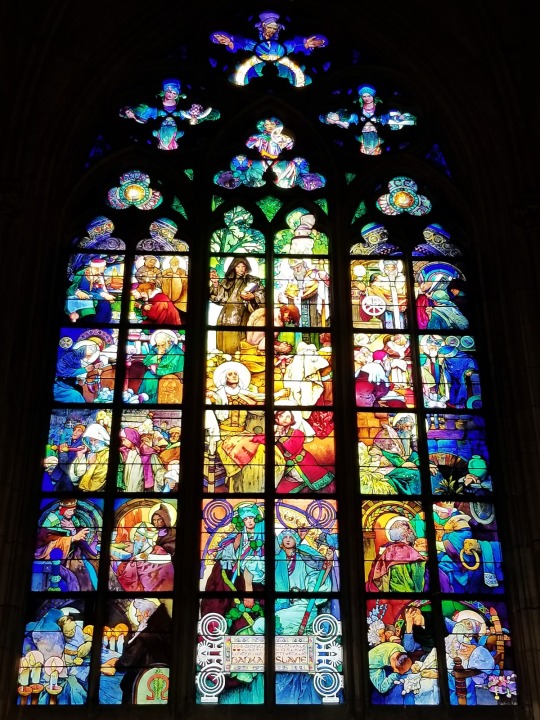
The center panes show a young St. Wenceslas being taught Christianity by his grandmother, St. Ludmila. The two young women at the bottom of the window represent the Czechs and Slovaks. And the sides tell the story of Saints Cyril and Methodius, two brothers who brought Christianity to the Slavic lands from Greece.
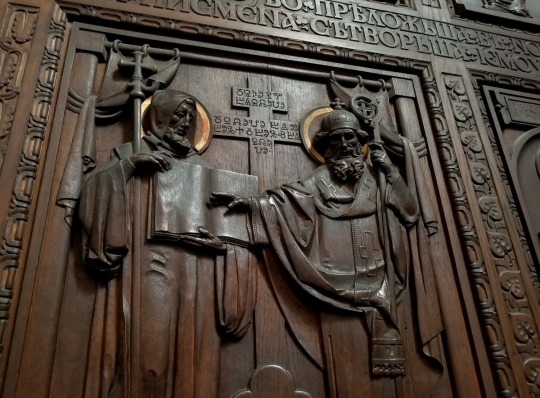
One of the brothers’ biggest problems in spreading Christianity was that the Slavs had no written alphabet. So Cyril, the younger brother, decided to invent one for them. Over the next few generations, that alphabet evolved into the modern Cyrillic alphabet, which is still used today in many Eastern European languages.
Sadly, the brothers’ lives didn’t go so well after that. When they returned to Rome to show the pope their new Cyrillic Bible, Cyril got sick and passed away. Methodius returned to Bohemia as an anointed bishop, but eventually a new pope came along and decided that the Cyrillic Bible was actually heretical. The church arrested Methodius and locked him away for years. He was eventually released, after which he spent the rest of his life quietly in a monastery.
So, if Wenceslas, Cyril, and Methodius are the three most-venerated Saints in Prague, why is the church named for St. Vitus, a 4th-century Sicilian boy who was boiled alive in tar?
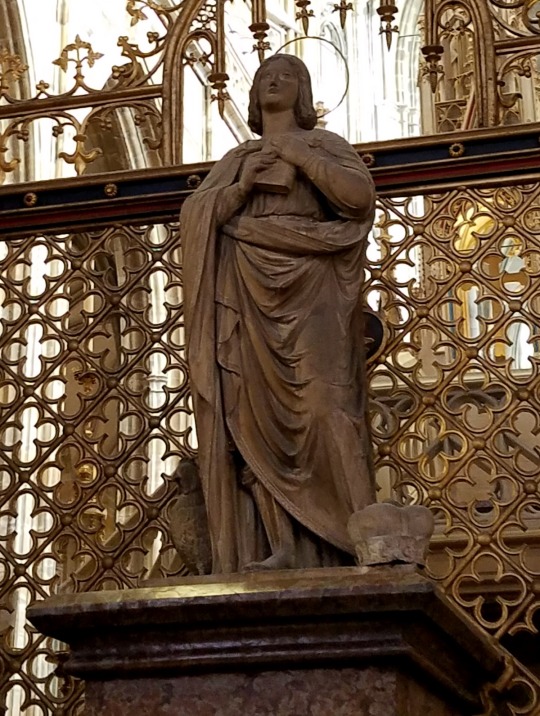
(The legend holds that a rooster was thrown into the vat of tar with Vitus as a sacrifice to the Roman gods, so Vitus is often depicted with a rooster at his feet. The legend also holds that Vitus was miraculously saved from the boiling tar. But not healed, so he still died--just later.)
In 925 AD, Duke Wenceslas--a Christian ruler of the still largely pagan Bohemia--received a relic of St. Vitus as a gift from the king of Germany. Wenceslas built St. Vitus Cathedral to house the relic, and it became an epicenter of Christianity in Bohemia.
It may have helped that the Slavic pronunciation of Vitus's name sounded a lot like the name of a pagan Slavic god.
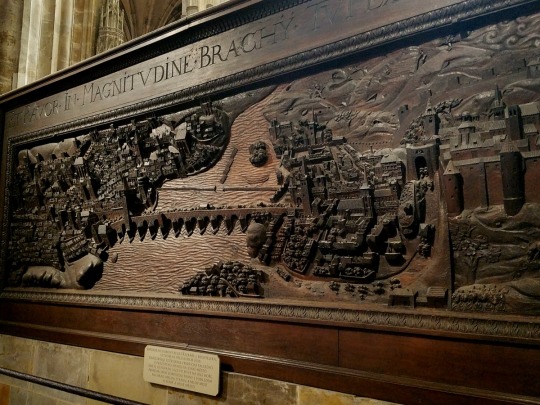
Other cool sights in the cathedral included a 400-year-old carving of the city of Prague as it stood in the early 1600s, as well as a massive silver tomb dedicated to another local saint: St. John of Nepomuk. John was a Bohemian priest who was murdered by King Wenceslas IV in 1396. The actual reason was most likely a disagreement over the appointment of a Benedictine abbot, but according to legend it was because John refused to divulge to the king what the queen had said to John during confession.
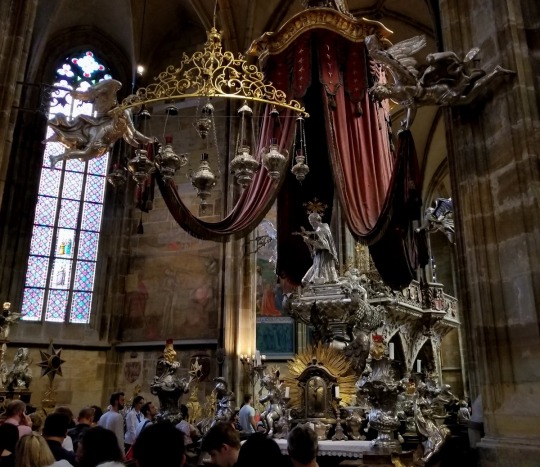
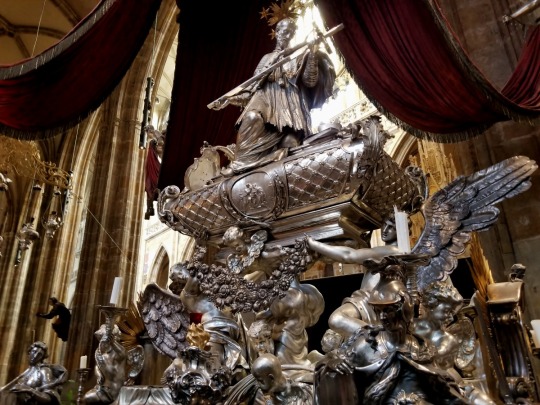
In any case, the tomb is staggeringly opulent. A huge crowd was gathered in front of it, and it was actually getting hard to move as we approached. Jessica was hit with a wave of claustrophobia and made her way through as quickly as she could, but I managed to stay behind a bit longer to get a good look.
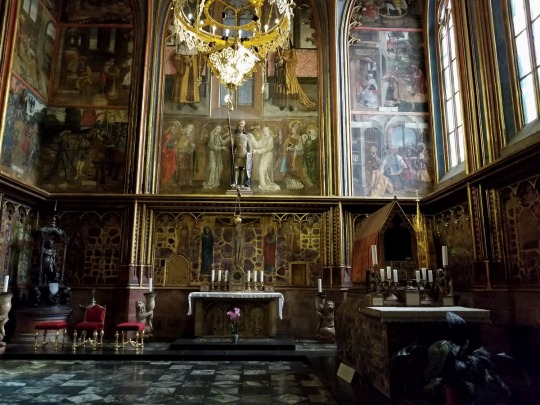
I also managed to get a peek into the gorgeous (and strictly cordoned) Chapel of St. Wenceslas, where the saint himself is entombed.
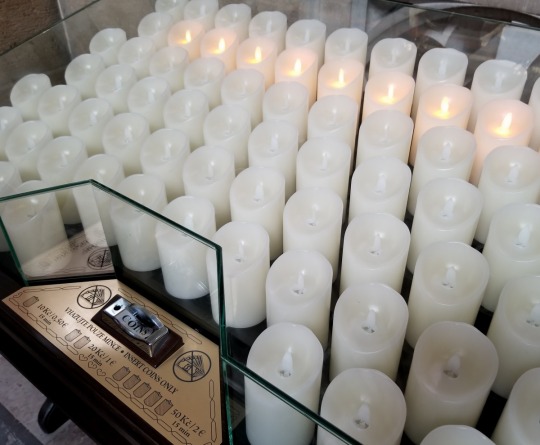
On our way out of the cathedral, we stopped for a moment to ponder the theological and economic implications of coin-operated electric votive candles.
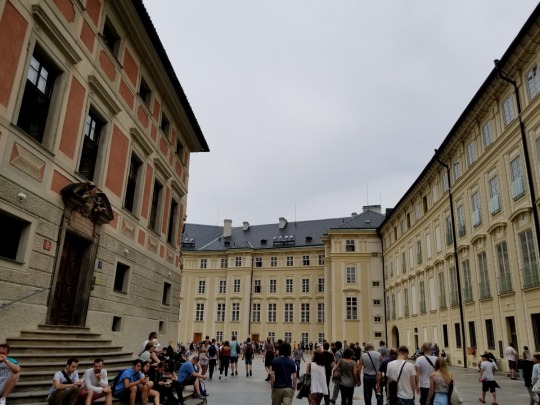
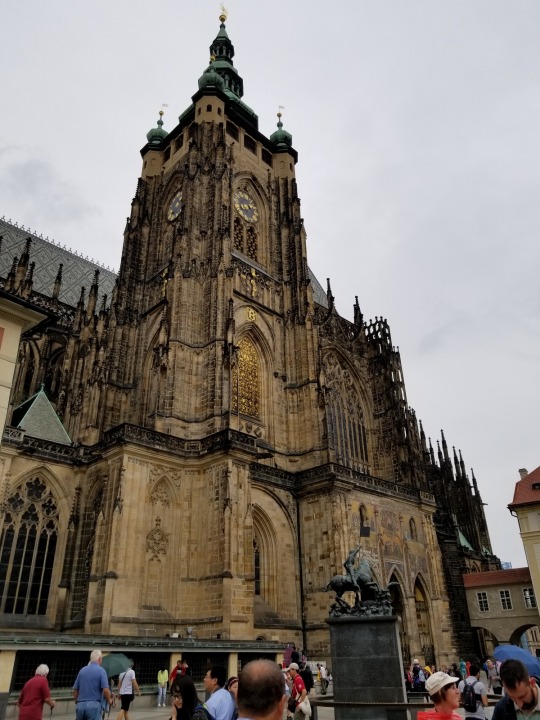
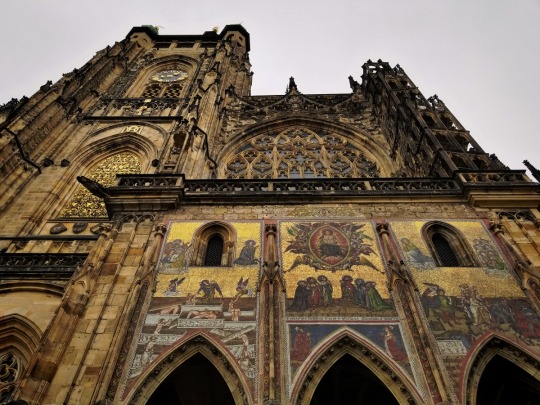
Back outside, we walked around the central courtyard to find the cathedral's spectacularly gilt south façade.
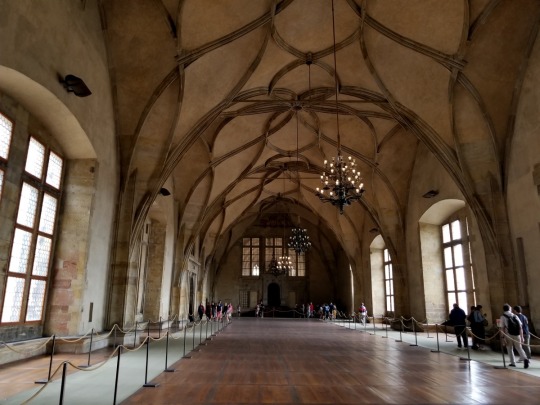
The next stop on the castle tour was the old royal palace. It was mostly empty, centered around a massive great hall that was once used for feasts, markets, and even jousting tournaments. Today, the palace holds the country's modest crown jewels, a throne room, and a room covered in painted coats of arms.
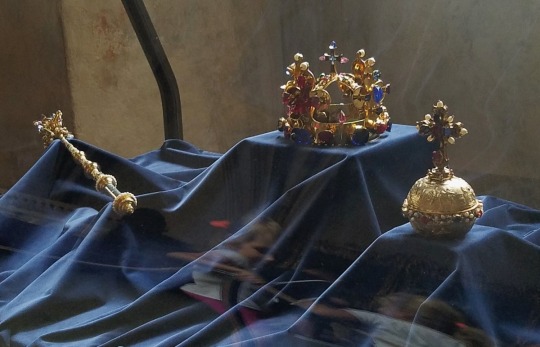
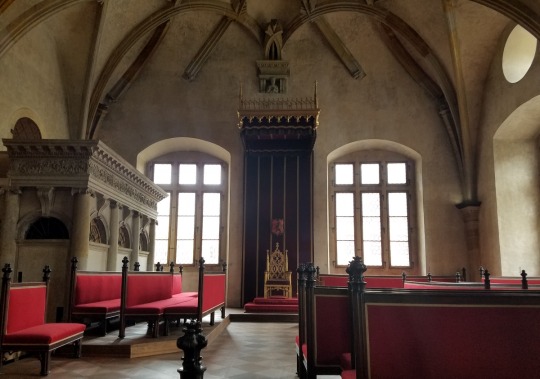
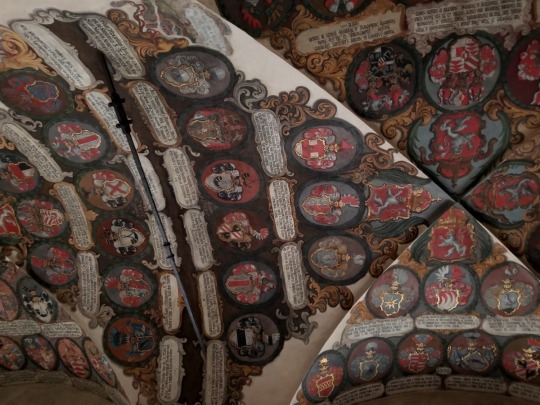
But the most important thing in the palace is a window. A window that helped spark the one of the bloodiest conflicts in all of European history--the Thirty Years’ War.
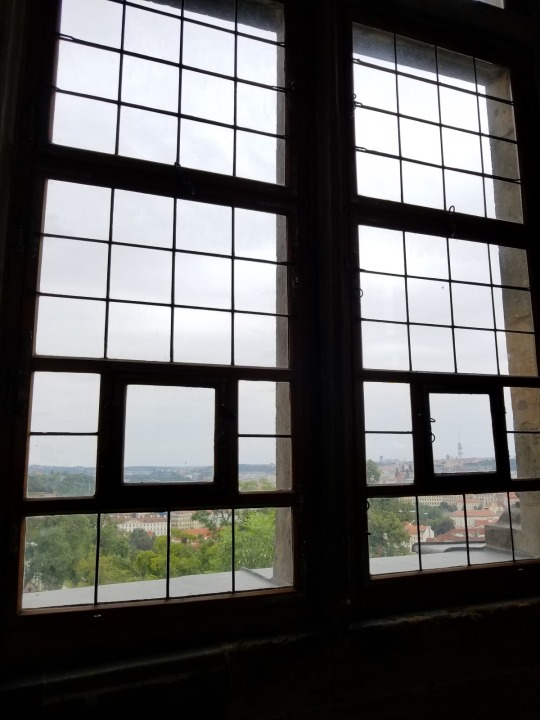
One of the few things I still remember from my high-school European History class is the Defenestration of Prague. Mostly because it taught me the word "defenestration."
Defenestration: (Noun) The act of throwing someone out of a window.
To me and all the other kids in the class, that was fantastic. In reality, of course, it was deadly serious.
Long story short: It is 1618. Under the terms of the Augsburg Settlement, rulers within the Holy Roman Empire could choose whether their state would be Protestant or Catholic. Bohemia is an Imperial state, and its rulers are Catholic. But much of Bohemia's nobility is Protestant, and they're tired of being ruled by Catholics.
So, following in the tradition of the Hussites 200 years earlier, the nobles go to Prague Castle and throw the Catholic rulers out of a window. One thing leads to another, alliances are invoked, opportunists join the fray, and soon all of Europe is embroiled in a brutal, convoluted war that kills millions--mostly German civilians caught in the middle.
In the hardest-hit German states, over half the pre-war population die by violence, plague, or starvation before the war ends.
The Peace of Westphalia--a series of treaties that finally ended the Thirty Years’ War in (appropriately) 1648--is seen by many as the beginning of the age of sovereign nation-states.
It’s kind of crazy to me that the idea of countries being independent entities with precisely defined borders and their own separate governments is only four or five hundred years old. But it’s true. Throughout the Middle Ages, Europe was more like a chessboard, with squares constantly being traded back and forth into increasingly large and convoluted hierarchies. A single marriage could join two countries together, and a single death could tear them apart again. One man could be the king of England, an heir to the throne of France, and also the descendant of a French duke. Does that make England part of France or France part of England? It took five generations of war to decided that the answer was “neither.”
You can’t really understand medieval and early-modern politics without adopting a much more fluid sense of what a country actually is. It’s still really hard for me to do, and I’ve spent a lot of time trying.
Anyway...
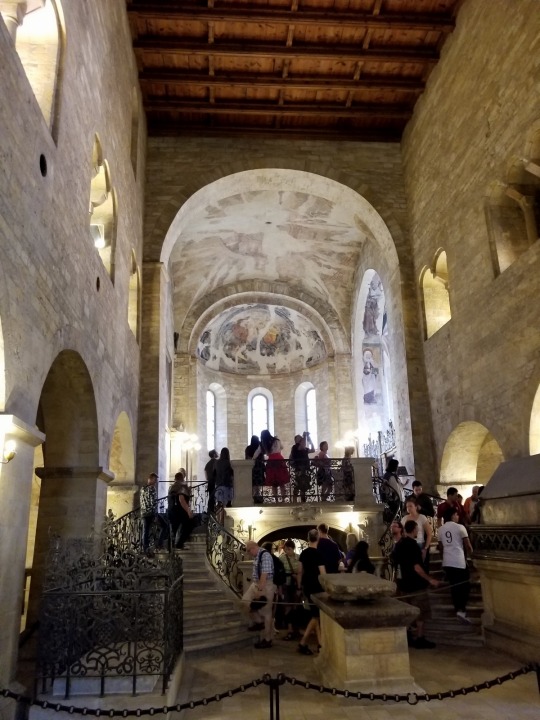
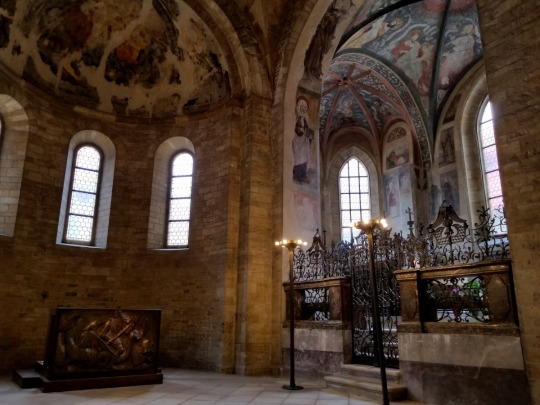
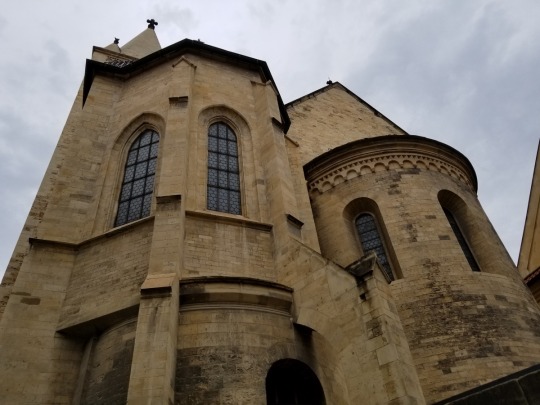
After the royal palace, we visited the Basilica of St. George--an old Romanesque church that served as the royal chapel before the construction of St. Vitus Cathedral. It is smaller, less crowded, and more intimate than St. Vitus. Among the old Czech rulers buried there is St. Ludmilla, St. Wenceslas's grandmother and the first Christian ruler of Bohemia along with her husband Bořivoj.
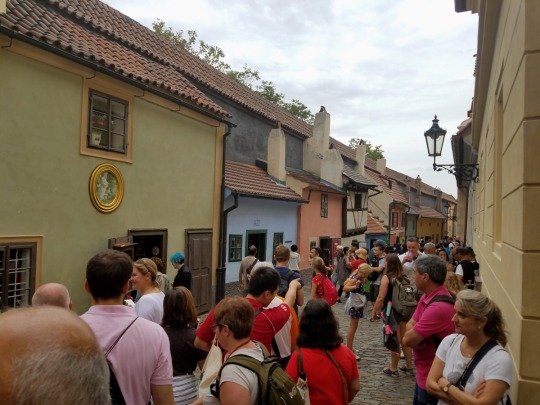
Our tickets gave us access to one more sight as we left the castle: a medieval shop-lined street called Golden Lane. The name comes from the goldsmiths who used to work their and serve the castle's opulent needs, but today it houses a wider variety of shops and museums. There were jewelry shops, of course, and a puppet shop that creeped Jessica right out.

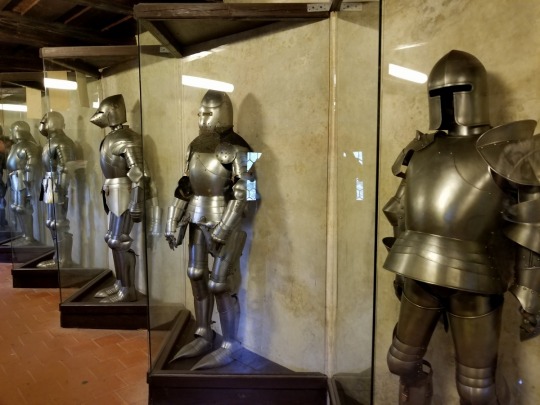
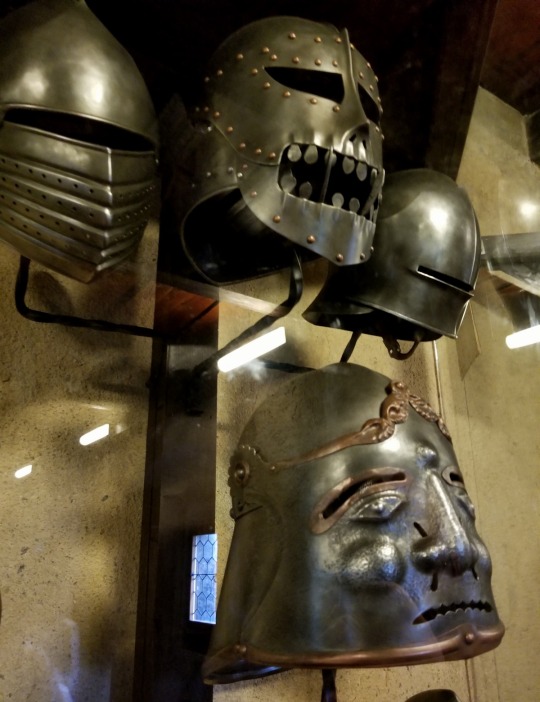
The coolest part for me was a showcase of medieval arms and armor, which was housed in the long attic that ran across the length of the street. Jessica found it immediately claustrophobia-inducing, so I stayed back to take pictures while she went on to look at the other shops along the lane.
Having made it from one end of the castle to the other, it was time for us to decide what to do next. There was the highly recommended Lobkowicz Palace--home to the oldest and largest private art collection in the Czech Republic--but Jessica and I had been around enough at this point to know that we didn't have another museum visit left in us that day.
The option we had in mind was a visit to the monastic brewery of Pivovar Strahov. It may have been considerably cooler than the previous days, but we had still worked up a strong thirst walking around the castle. Some traditionally brewed beer from a 17th-century monastery sounded like just the right way to cap off our stay in Prague.
Of course, that meant turning around and walking all the way back up through Prague Castle and another half-mile uphill beyond. It was worth it, though.
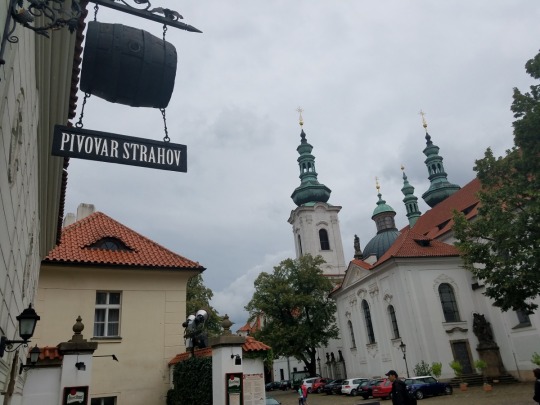
I'd wanted to try their "most award-winning" dark lager, but sadly it was sold out. So instead, I opted for their mainstay amber lager. Jessica chose from the more adventurous seasonal menu a coconut wet-hop ale.
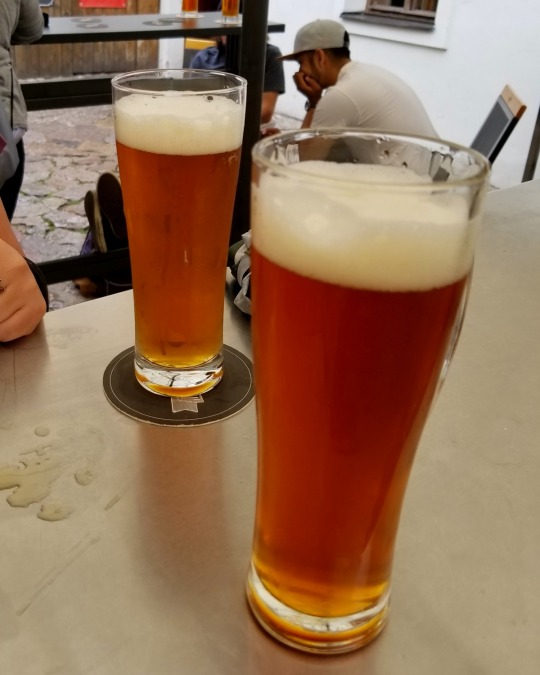
Both were good, but we each preferred our own choice.
Thoroughly spent, we called an Uber to take us back to our flat. Jessica tried to make small talk with the driver, but he cut her off with a cursing tirade against an aggressive cyclist on the road. Typical Slavic conversation atmosphere.
Overall, Prague was one of our most challenging cities, but it also left us wanting more. Even five perfect days would not have been enough, and with so much heat and so little sleep, we had been at a significant handicap. So instead of pushing ourselves to see one last thing, we contented ourselves to an early evening and an eager desire to return--preferably during spring.
Next Post: To Vienna
Last Post: The Slave Epic (and a Break for Beer)
5 notes
·
View notes
Text
Elisabeth das Musical exposition/setting notes
Back when I was translating the ‘92 Vienna rehearsal footage to English I ended up digging deeper than I probably should have into lyrics, because I was kinda fascinated with how precisely you could pinpoint some of the songs in time that way.
I ended up including an extremely short summary of...fun trivia I learned as footnotes in my yt videos for Americans and other aliens (...kidding. kidding! Not like I really remember what was up with Spring of Nations either other than ‘Poland was there too’...) but since a) like nobody watches ‘92 Elisabeth b) if they do they are almost guaranteed not to read video descriptions anyway, I finally decided to repost this here.
Or, you know, you can check out @land-of-blitheness-and-catharsis Vienna Revival Elisabeth translations for some way more entertaining background comments.
PROLOG
[1] Luigi Lucheni (1873-1910)
Italian anarchist famous for assassinating Empress Elisabeth of Austria in 1898. Died in 1910 by hanging himself in his cell while serving a life sentence in Geneva.
Curiously enough, his head had been preserved in formaldehyde and only buried in 2000, 90 years after his death.
[2] Grammar bonus in case you live under a rock: German is a language with what is known as grammatical gender, effectively making the noun 'death' come with built-in male pronouns unless stated otherwise.
[3] "Why not? She loved Heinrich Heine!"
Heinrich Heine (1797 – 1856)
Born to a Jewish family but later converted to Christianity, German poet, journalist, essayist, and literary critic. Elisabeth was something of a fan, to put it mildly.
WIE DU
[4] "In this case, it's impossible."
Elisabeth absolutely can't come with her father because, according to the libretto, he is actually on his way to spend a night with an actress in Monachium.
[5] "...with a zither under one arm"
The flat, black box Elisabeth doesn't want to give back to her father is indeed a zither case.
JEDEM GIBT ER DAS SEINE
[6] Franz-Joseph I of Austria (1830 – 1916)
The oldest of four brothers, ascended the throne in 1848 at the age of eighteen when, after his epileptic uncle's Ferdinand I abdication, his father stepped aside in his favor.
[7] "Russia, we owe rescue.../...from the revolution."
In 1848 a wave of political upheavals swept across Europe, an event known as the Spring of Nations. Stuck between fighting in the territories of today's Italy and the rebelling Hungarians, who were at the time under the rule of the Austrian Empire, Austria lacked the power to quell the latter. Assistance from its ally, Russia, was sent for and the revolution suppressed.
[8] Crimean War (1853 - 1856)
Military conflict fought between Russia and an alliance of France, the British Empire, the Ottoman Empire, and Sardinia started over the rights of Christian minorities in the Ottoman Empire. Russia lost and apparently was none too happy about Austrian Empire choosing to remain neutral.
SIE PASST NICHT
[9] "Rauscher's speech was too long."
Joseph Othmar Ritter von Rauscher (1797-1875), Cardinal and Austrian Prince-Archbishop of Vienna, considered the father of the Austrian Concordat of 1855. This will kinda keep coming up.
DER LETZTE TANZ
[10] "In mirror room" (der Spiegelsaal)
Large mirrors used to be difficult to produce and thus very expensive. Naturally, for a while small rooms and galleries with mirrors embedded in the walls seem to have been a must-have in every grand residence.
DIE ERSTEN VIER JAHRE
[11] "Where does she stand on Hungary?"
After the rebellion of 1848 Hungary wasn't exactly in the Austrian Empire's best books. A lot of its former independence was taken away.
DIE FRÖHLICHE APOKALYPSE
[12] "One more coffee!"
Wiener Melange ("Viennese blend") is a type of coffee drink specific to Vienna, traditionally consisting of a shot of expresso topped with hot milk and milk foam.
[13] We've signed a concordat!"
A concordat is convention between the Holy See and a sovereign state that defines the [..] privileges of the Catholic Church in a particular country. (Thanks wikipedia...)
In the case of Austrian Concordat of 1855 the Church was granted full control over their direct affairs, oversight of approx 98% of public schools and their curriculum as well as jurisdiction over marriages where either or both the couple were Catholic.
In other words something of a big deal and most liberals really weren't a fan.
[14] "The last Crimean War neutralized us.../And Austria is now.../
...politically, completely isolated./[...]/And we are now at war with Piedmont!"
In 1858 England and, more importantly, Russia, is definitely still sulking over Austrian Empire's neutrality in the Crimean War. In the meanwhile wars in what is today's Italy continue, notably with the Kingdom of Piedmont-Sardinia.
Up until 1871 Italy was a collection of small kingdoms/city states. The Second Italian War of Independence of 1859 will prove to be a crucial part of their future unification.
[15] "...crowds of men waving their fists/at her on Ballhausplatz."
The Ballhausplatz is a square in central Vienna and the location of the residence/set of office of the Chancellor of Austria.
It's also located a short walk's distance from the Austrian Parliament building.
SCHÖNHEITSPFLEGE
[16] "Here, veal for the face./Lay it in thick slices on the cheeks.../[...]/The meat sauce, that she drinks at midday.../...has to, imagine.../...absolutely be from a fillet." etc
Supposedly all true. She is also known for fasting, exercising rigorously and tight-lacing her corsets to a worrying degree.
WIR ODER SIE
[17] "A ringleader advanced.../...to a minister of state!"
Likely refers to Count Gyula Andrássy (1823 – 1890), a Hungarian statesman who, in 1867, with Elisabeth's backing became Prime Minister of Hungary. By all accounts a close friend, thought to be lover by some.
[18] "...she rules like a Pompadour!"
Madame de Pompadour (1721 – 1764) chief mistress of French king Louis XV and, later, his close friend and confidant. While having little official political influence, she was able to gather a network of supporters and wielded considerable power behind the scenes.
[19] "Instead of Goethe or Schiller.../...she recites Heine!"
A serious offense indeed seeing as Goethe and Schiller are some of the most iconic/well-known German-language writers, while Heine's more radical works were banned.
[20] "I will, myself, undertake.../...delivering a Circe to him"
In the Greek epic poem Odyssey, the hero Odysseus is steadfast and unrelenting in his attempt to return home to his faithul wife Penelope, except for that one entire year he spends feasting and sharing a bed of a powerful sorceress named Circe. Because why not.
MALADIE
[21] "One.../...known as the French disease."
Anemia, fever and dizzy spells are not exactly the most prominent symptoms of secondary syphillis and Elisabeth's bad health is only speculated to be a result of a veneral disease instead of constant stress she was under, but I suppose we’ll just have to trust the personification of death on this one. You'd assume he'd know.
DIE RASTLOSEN JAHRE
[22] "Wants to Corfu, Pest and England..."
Budapest is the capital and the largest city of Hungary. Originally two separate cities, Buda and Pest, it became a single city occupying both banks of the river Danube in 1873.
DIE SCHATTEN WERDEN LÄNGER
[23] "To the tune of the Pied Piper.../...they dance wildly..."
"Der Rattenfänger von Hameln", better known in the Anglosphere as "The Pied Piper of Hamelin" is a German legend concerning a rat-catcher hired to lead rats away from the city of Hamelin using his magical flute. When the townsfolk refuse to give him the promised payment, he turns the magic on the town's children instead, luring them all into the unknown.
HASS
[24] "Nationalists! Supporters of Schönerer."
Georg Ritter von Schönerer (1842 – 1921), German landowner, politician, rabid nationalist and antisemite. In 1888, he was temporarily jailed for ransacking a newspaper office and his popularity soared, with nationalist marches organized to demand freeing him etc. Likely the person to introduce Führer (”leader") to the nationalist vocabulary. All around a great guy like that. Hitler is said to have been a big fan as a young man.
[25] "Wilhelm should be Emperor!"
Wilhelm II (1859 – 1941), the last German Emperor and Austrian nationalists' preferred Habsburg replacement.
[26] "For Heinrich Heine she wants to, here, in Vienna.../...erect a statue!"
She really did, except by the time it was finished, the nationalist protests were so widespread there was nowhere to put it. Somehow, and don't ask me how or why, it is now located in Bronx, New York City and known as the Lorelei Fountain.
[27] "The Guard on the Rhine stands proud!"
"Die Wacht am Rhein" is a famous patriotic German song, for a while considered something of an unofficial second anthem.
MAYERLING-WALZER
[28] Rudolf, Crown Prince of Austria and his 17-year-old lover Baroness Mary Vetsera died on 30 January 1889 in what is widely considered to be a murder-suicide pact, known as the Mayerling Incident.
His death caused Franz-Joseph I's nephew, Archduke Franz Ferdinand, to become first in line to the throne of Austro-Hungarian Empire.
Franz Ferdinand is perhaps best known as the man whose assassination in Sarajevo in 1914 kickstarted the WWI.
AM DECK DER SINKENDEN WELT
[29] Maximillian I (1832 – 1867)
Younger brother of Emperor Franz-Joseph. Accepted Napoleon III's offer to move to Mexico where he declared himself Emperor in 1864 and was executed by firing squad three years later.
[30] Maria von Wittelsbach (1841 - 1925)
Elisabeth's younger sister. By all accounts a rather unhappy lady with an equally unhappy marriage.
[31] Ludwig von Wittelsbach (1845 – 1886)
Elisabeth's cousin, king of Bavaria. Known as an eccentric with a love for extravagant artistic and architectural projects. Declared insane and deposed in 1886, died under unknown circumstances. Body found floating in a lake near his residence at the time.
[32] Sophie von Wittelsbach (1847 – 1897)
Elisabeth's youngest sister, died in a fire of the Bazar de la Charité in Paris, during a charity event.
DER SCHLEIER FÄLLT
[33] Elisabeth, Empress of Austria died on the 10 September 1898 after being fatally stabbed in the heart with a stiletto improvised out of a sharpened needle file. Perhaps thanks to her practice of lacing her corsets very tightly the injury wasn't immediately detected and it took half an hour for her to die.
Ironically, first recorded successful treatment of this exact kind of injury was achieved by dr Ludwig Rehn in Frankfurt am Main exactly two years and one day before that date.
...also something I failed to mention in footnotes, but occurs to me not everyone knows: yes, a porcelain tea set with portraits of Franz-Joseph and Elisabeth painted on it was not a very strange item to own. That’s kind of what Kitsch is about XD
34 notes
·
View notes
Text
Daily Office Readings August 12, 2020
Psalm 101
Psalm 101
A Sovereign’s Pledge of Integrity and Justice
Of David. A Psalm.
1 I will sing of loyalty and of justice;
to you, O Lord, I will sing.
2 I will study the way that is blameless.
When shall I attain it?
I will walk with integrity of heart
within my house;
3 I will not set before my eyes
anything that is base.
I hate the work of those who fall away;
it shall not cling to me.
4 Perverseness of heart shall be far from me;
I will know nothing of evil.
5 One who secretly slanders a neighbor
I will destroy.
A haughty look and an arrogant heart
I will not tolerate.
6 I will look with favor on the faithful in the land,
so that they may live with me;
whoever walks in the way that is blameless
shall minister to me.
7 No one who practices deceit
shall remain in my house;
no one who utters lies
shall continue in my presence.
8 Morning by morning I will destroy
all the wicked in the land,
cutting off all evildoers
from the city of the Lord.
New Revised Standard Version Catholic Edition (NRSVCE)
New Revised Standard Version Bible: Catholic Edition, copyright © 1989, 1993 the Division of Christian Education of the National Council of the Churches of Christ in the United States of America. Used by permission. All rights reserved.
Psalm 109:1-30
Psalm 109
Prayer for Vindication and Vengeance
To the leader. Of David. A Psalm.
1 Do not be silent, O God of my praise.
2 For wicked and deceitful mouths are opened against me,
speaking against me with lying tongues.
3 They beset me with words of hate,
and attack me without cause.
4 In return for my love they accuse me,
even while I make prayer for them.[a]
5 So they reward me evil for good,
and hatred for my love.
6 They say,[b] “Appoint a wicked man against him;
let an accuser stand on his right.
7 When he is tried, let him be found guilty;
let his prayer be counted as sin.
8 May his days be few;
may another seize his position.
9 May his children be orphans,
and his wife a widow.
10 May his children wander about and beg;
may they be driven out of[c] the ruins they inhabit.
11 May the creditor seize all that he has;
may strangers plunder the fruits of his toil.
12 May there be no one to do him a kindness,
nor anyone to pity his orphaned children.
13 May his posterity be cut off;
may his name be blotted out in the second generation.
14 May the iniquity of his father[d] be remembered before the Lord,
and do not let the sin of his mother be blotted out.
15 Let them be before the Lord continually,
and may his[e] memory be cut off from the earth.
16 For he did not remember to show kindness,
but pursued the poor and needy
and the brokenhearted to their death.
17 He loved to curse; let curses come on him.
He did not like blessing; may it be far from him.
18 He clothed himself with cursing as his coat,
may it soak into his body like water,
like oil into his bones.
19 May it be like a garment that he wraps around himself,
like a belt that he wears every day.”
20 May that be the reward of my accusers from the Lord,
of those who speak evil against my life.
21 But you, O Lord my Lord,
act on my behalf for your name’s sake;
because your steadfast love is good, deliver me.
22 For I am poor and needy,
and my heart is pierced within me.
23 I am gone like a shadow at evening;
I am shaken off like a locust.
24 My knees are weak through fasting;
my body has become gaunt.
25 I am an object of scorn to my accusers;
when they see me, they shake their heads.
26 Help me, O Lord my God!
Save me according to your steadfast love.
27 Let them know that this is your hand;
you, O Lord, have done it.
28 Let them curse, but you will bless.
Let my assailants be put to shame;[f] may your servant be glad.
29 May my accusers be clothed with dishonor;
may they be wrapped in their own shame as in a mantle.
30 With my mouth I will give great thanks to the Lord;
I will praise him in the midst of the throng.
Footnotes:
Psalm 109:4 Syr: Heb I prayer
Psalm 109:6 Heb lacks They say
Psalm 109:10 Gk: Heb and seek
Psalm 109:14 Cn: Heb fathers
Psalm 109:15 Gk: Heb their
Psalm 109:28 Gk: Heb They have risen up and have been put to shame
New Revised Standard Version Catholic Edition (NRSVCE)
New Revised Standard Version Bible: Catholic Edition, copyright © 1989, 1993 the Division of Christian Education of the National Council of the Churches of Christ in the United States of America. Used by permission. All rights reserved.
Psalm 119:121-144
121 I have done what is just and right;
do not leave me to my oppressors.
122 Guarantee your servant’s well-being;
do not let the godless oppress me.
123 My eyes fail from watching for your salvation,
and for the fulfillment of your righteous promise.
124 Deal with your servant according to your steadfast love,
and teach me your statutes.
125 I am your servant; give me understanding,
so that I may know your decrees.
126 It is time for the Lord to act,
for your law has been broken.
127 Truly I love your commandments
more than gold, more than fine gold.
128 Truly I direct my steps by all your precepts;[a]
I hate every false way.
129 Your decrees are wonderful;
therefore my soul keeps them.
130 The unfolding of your words gives light;
it imparts understanding to the simple.
131 With open mouth I pant,
because I long for your commandments.
132 Turn to me and be gracious to me,
as is your custom toward those who love your name.
133 Keep my steps steady according to your promise,
and never let iniquity have dominion over me.
134 Redeem me from human oppression,
that I may keep your precepts.
135 Make your face shine upon your servant,
and teach me your statutes.
136 My eyes shed streams of tears
because your law is not kept.
137 You are righteous, O Lord,
and your judgments are right.
138 You have appointed your decrees in righteousness
and in all faithfulness.
139 My zeal consumes me
because my foes forget your words.
140 Your promise is well tried,
and your servant loves it.
141 I am small and despised,
yet I do not forget your precepts.
142 Your righteousness is an everlasting righteousness,
and your law is the truth.
143 Trouble and anguish have come upon me,
but your commandments are my delight.
144 Your decrees are righteous forever;
give me understanding that I may live.
Footnotes:
Psalm 119:128 Gk Jerome: Meaning of Heb uncertain
New Revised Standard Version Catholic Edition (NRSVCE)
New Revised Standard Version Bible: Catholic Edition, copyright © 1989, 1993 the Division of Christian Education of the National Council of the Churches of Christ in the United States of America. Used by permission. All rights reserved.
Judges 13:15-24
15 Manoah said to the angel of the Lord, “Allow us to detain you, and prepare a kid for you.” 16 The angel of the Lord said to Manoah, “If you detain me, I will not eat your food; but if you want to prepare a burnt offering, then offer it to the Lord.” (For Manoah did not know that he was the angel of the Lord.) 17 Then Manoah said to the angel of the Lord, “What is your name, so that we may honor you when your words come true?” 18 But the angel of the Lord said to him, “Why do you ask my name? It is too wonderful.”
19 So Manoah took the kid with the grain offering, and offered it on the rock to the Lord, to him who works[a] wonders.[b] 20 When the flame went up toward heaven from the altar, the angel of the Lord ascended in the flame of the altar while Manoah and his wife looked on; and they fell on their faces to the ground. 21 The angel of the Lord did not appear again to Manoah and his wife. Then Manoah realized that it was the angel of the Lord. 22 And Manoah said to his wife, “We shall surely die, for we have seen God.” 23 But his wife said to him, “If the Lord had meant to kill us, he would not have accepted a burnt offering and a grain offering at our hands, or shown us all these things, or now announced to us such things as these.”
24 The woman bore a son, and named him Samson. The boy grew, and the Lord blessed him.
Footnotes:
Judges 13:19 Gk Vg: Heb and working
Judges 13:19 Heb wonders, while Manoah and his wife looked on
New Revised Standard Version Catholic Edition (NRSVCE)
New Revised Standard Version Bible: Catholic Edition, copyright © 1989, 1993 the Division of Christian Education of the National Council of the Churches of Christ in the United States of America. Used by permission. All rights reserved.
Acts 6
Seven Chosen to Serve
6 Now during those days, when the disciples were increasing in number, the Hellenists complained against the Hebrews because their widows were being neglected in the daily distribution of food. 2 And the twelve called together the whole community of the disciples and said, “It is not right that we should neglect the word of God in order to wait on tables.[a] 3 Therefore, friends,[b] select from among yourselves seven men of good standing, full of the Spirit and of wisdom, whom we may appoint to this task, 4 while we, for our part, will devote ourselves to prayer and to serving the word.” 5 What they said pleased the whole community, and they chose Stephen, a man full of faith and the Holy Spirit, together with Philip, Prochorus, Nicanor, Timon, Parmenas, and Nicolaus, a proselyte of Antioch. 6 They had these men stand before the apostles, who prayed and laid their hands on them.
7 The word of God continued to spread; the number of the disciples increased greatly in Jerusalem, and a great many of the priests became obedient to the faith.
The Arrest of Stephen
8 Stephen, full of grace and power, did great wonders and signs among the people. 9 Then some of those who belonged to the synagogue of the Freedmen (as it was called), Cyrenians, Alexandrians, and others of those from Cilicia and Asia, stood up and argued with Stephen. 10 But they could not withstand the wisdom and the Spirit[c] with which he spoke. 11 Then they secretly instigated some men to say, “We have heard him speak blasphemous words against Moses and God.” 12 They stirred up the people as well as the elders and the scribes; then they suddenly confronted him, seized him, and brought him before the council. 13 They set up false witnesses who said, “This man never stops saying things against this holy place and the law; 14 for we have heard him say that this Jesus of Nazareth[d] will destroy this place and will change the customs that Moses handed on to us.” 15 And all who sat in the council looked intently at him, and they saw that his face was like the face of an angel.
Footnotes:
Acts 6:2 Or keep accounts
Acts 6:3 Gk brothers
Acts 6:10 Or spirit
Acts 6:14 Gk the Nazorean
New Revised Standard Version Catholic Edition (NRSVCE)
New Revised Standard Version Bible: Catholic Edition, copyright © 1989, 1993 the Division of Christian Education of the National Council of the Churches of Christ in the United States of America. Used by permission. All rights reserved.
John 4:1-26
Jesus and the Woman of Samaria
4 Now when Jesus[a] learned that the Pharisees had heard, “Jesus is making and baptizing more disciples than John” 2 —although it was not Jesus himself but his disciples who baptized— 3 he left Judea and started back to Galilee. 4 But he had to go through Samaria. 5 So he came to a Samaritan city called Sychar, near the plot of ground that Jacob had given to his son Joseph. 6 Jacob’s well was there, and Jesus, tired out by his journey, was sitting by the well. It was about noon.
7 A Samaritan woman came to draw water, and Jesus said to her, “Give me a drink.” 8 (His disciples had gone to the city to buy food.) 9 The Samaritan woman said to him, “How is it that you, a Jew, ask a drink of me, a woman of Samaria?” (Jews do not share things in common with Samaritans.)[b] 10 Jesus answered her, “If you knew the gift of God, and who it is that is saying to you, ‘Give me a drink,’ you would have asked him, and he would have given you living water.” 11 The woman said to him, “Sir, you have no bucket, and the well is deep. Where do you get that living water? 12 Are you greater than our ancestor Jacob, who gave us the well, and with his sons and his flocks drank from it?” 13 Jesus said to her, “Everyone who drinks of this water will be thirsty again, 14 but those who drink of the water that I will give them will never be thirsty. The water that I will give will become in them a spring of water gushing up to eternal life.” 15 The woman said to him, “Sir, give me this water, so that I may never be thirsty or have to keep coming here to draw water.”
16 Jesus said to her, “Go, call your husband, and come back.” 17 The woman answered him, “I have no husband.” Jesus said to her, “You are right in saying, ‘I have no husband’; 18 for you have had five husbands, and the one you have now is not your husband. What you have said is true!” 19 The woman said to him, “Sir, I see that you are a prophet. 20 Our ancestors worshiped on this mountain, but you[c] say that the place where people must worship is in Jerusalem.” 21 Jesus said to her, “Woman, believe me, the hour is coming when you will worship the Father neither on this mountain nor in Jerusalem. 22 You worship what you do not know; we worship what we know, for salvation is from the Jews. 23 But the hour is coming, and is now here, when the true worshipers will worship the Father in spirit and truth, for the Father seeks such as these to worship him. 24 God is spirit, and those who worship him must worship in spirit and truth.” 25 The woman said to him, “I know that Messiah is coming” (who is called Christ). “When he comes, he will proclaim all things to us.” 26 Jesus said to her, “I am he,[d] the one who is speaking to you.”
Footnotes:
John 4:1 Other ancient authorities read the Lord
John 4:9 Other ancient authorities lack this sentence
John 4:20 The Greek word for you here and in verses 21 and 22 is plural
John 4:26 Gk I am
New Revised Standard Version Catholic Edition (NRSVCE)
New Revised Standard Version Bible: Catholic Edition, copyright © 1989, 1993 the Division of Christian Education of the National Council of the Churches of Christ in the United States of America. Used by permission. All rights reserved.
0 notes